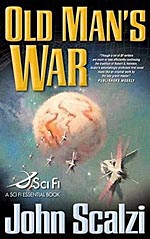
![]() Sable Aradia
Sable Aradia
3/2/2018
![]()
Read for the Military Spec-Fic Reading Challenge, the Second Best Reading Challenge, and the Space Opera Reading Challenge.
This book was nominated for the Hugo and Locus Awards 2006.
I really, really liked this book! It's kind of like the bridge between Starship Troopers (a relatively cheerful take on future wars with aliens) and The Forever War (a rather dark look at the same subject.) If you like Military Space Opera, you couldn't go wrong to read these three books, and throw Ender's Game in on top of it. I think this one will remind us vintage sci-fi fans of the other two, but Scalzi has some different things to say.
The theme is the real magic of what's going on here. The protagonist of this novel, John Perry, turned 75 and, like many senior citizens do at that age, he joined up with the space infantry. The deal? You get a new body capable of fighting aliens, presumably resetting your lifespan to a younger starting point. The trade? It's WAR. Attrition is scary. You will probably die within the decade. Would you take the trade?
John Perry is not a youth, either. He's a man who's lived a full and productive life. He has lots of memories and experiences, and I can't help but feel he and his wife, Kathy, might be a bit autobiographical (loosely based on Scalzi and his own wife).
Being middle aged myself, I find myself wondering if the characters are a bit more like middle aged people than old people per se. On the other hand, how do you communicate "old" in the future? I give Scalzi a nod for doing a great job of capturing the fullness of life experience without dating his story with pop culture references.
There's also some turns and twists when we encounter Perry's polar opposites; clone soldiers. Here my best comparison would be the issues raised by Lois McMaster Bujold in her Vorkosigan Saga books in regards to the clones on Jackson's Whole.
I think the differences between Heinlein's, Haldeman's, Card's and Scalzi's takes on future space war can be summed up in how they start. Heinlein's space soldiers volunteer as young people to get the right to vote and participate in the politics of their society; or, like the protagonist, to find themselves. Haldeman's space soldiers are promising young people who are drafted. Card's are children who are drafted. Scalzi's space soldiers are volunteers, but let's face it: when death must happen within a few years, it's nearly extortion to make that kind of offer. "You have a terminal illness that will kill you in five to ten years, and we know that's a fact. On the other hand, if you go to war for us, we can fix that." Powerful incentive.
Heinlein and Card were trying to say something about society and ethics. Haldeman was trying to say something about death. Scalzi is trying to say something about life.
Extra kudos: Scalzi's aliens are magnificent. They have completely different societies and biological makeups from us, some of which is utterly incomprehensible from a human standpoint.
I hope that in the subsequent books in the series, Scalzi will explore some of the deeply troubling ethical questions that have come up, which I can't share because they'd be spoilers.
All in all, I see why it is frequently compared to these other books (not so much Ender's Game usually, but the other two): it reads a lot like a good Heinlein novel, only it's like if Heinlein were writing a grown-up version instead of a juvenile. I enjoyed it a lot!
http://dianemorrison.wordpress.com